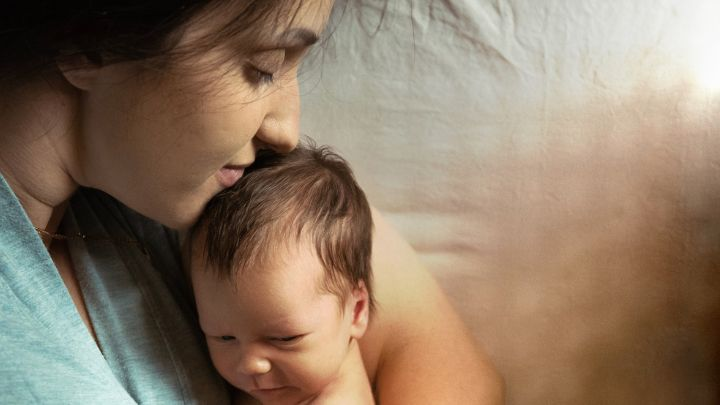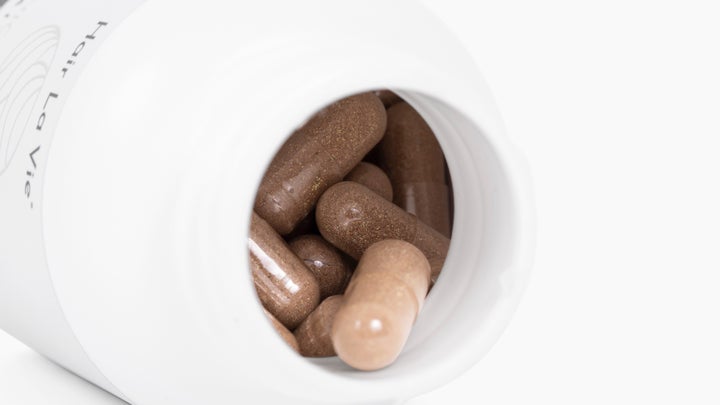Postpartum hair loss: Causes, treatments, and what to expect

Being a new mom can be a joyful period, but it brings with it so many new and challenging aspects of postpartum life, such as common hair loss. However, don't worry! While it can be distressing, postpartum hair loss is completely normal and prevalent and affects many women after giving birth. So, let's dive into what postpartum hair loss is and how you can embrace this temporary change.
Your hair grows in a three-phase hair growth cycle. First up is the anagen phase, the active growth phase that determines the length of your hair. Depending on your genetics and other factors, this phase can last anywhere from 2 to 7 years.
Next up is the catagen phase, which is a transitional period that lasts for about ten days. During this phase, your hair follicle starts to shrink, and your hair stops growing.
Finally, there's the telogen phase, which is the resting phase that lasts for around 3 to 4 months. This is when your old hair falls out and is replaced by new hair, starting the cycle all over again.
It's important to note that not all hair follicles are in the same phase at the same time, so your hair shedding is a continuous process. Understanding the hair growth cycle can help you take better care of your hair.
During pregnancy, your hair may have been thick, shiny, and full of life thanks to increased levels of estrogen in your body. However, after giving birth, those estrogen levels drop rapidly, causing your hair to shed more than usual. This shedding usually occurs between three and six months after birth, can last for several months, and is a common and temporary part of the postpartum experience. It’s also often seen as a sign that your body is returning to its pre-pregnancy state.
When it comes to regular hair loss, it can affect anyone. While there are many different causes of hair loss, most of them can be addressed. It can be related to hormones, everyday stress, or genetic conditions. So, whether you're experiencing postpartum hair loss or regular hair loss, there are plenty of reasons to stay positive.
1. Eat a well-balanced diet. Ensure you're getting plenty of protein from meat or plant-based sources, which is essential for hair growth.
2. Make sure you're getting enough vitamins and minerals. Vitamins A, C, and E, along with omega fatty acids, are all important for hair health, as are minerals like zinc and selenium. You can get these nutrients from a variety of foods, including fish, fruits, vegetables, whole grains, and nuts.
3. Stay hydrated. Drinking plenty of water can help keep your hair and scalp healthy, and it's good for your overall health too. Aim for at least eight glasses of water a day.

When it comes to haircare, taking a hair growth nutritional supplement can help support hair growth and the appearance of thicker hair. We also recommend using hair products like a good shampoo and conditioner that are gentle on your hair and naturally-derived ingredients formulated to help strengthen and nourish your hair.
Another way to help support healthy hair growth is to use a nutrient-rich scalp oil and massage it into the scalp. This helps deliver the nutrients like vitamin E directly into the follicles and helps promote scalp circulation, which is essential for hair growth. This also helps to reduce stress and can be deeply calming. Helping to alleviate and lower everyday stress not only helps with minimizing hair shedding but will also support your overall health and wellness.
Finally, there are several ways to style hair to make it appear fuller and give you back a sense of confidence. You can use volumizing and thickening hair products and even change where you part your hair to conceal visible thinning. We know it can be a disheartening concern, but there’s so much you can do to help the process along. Finding emotional support from trusted friends or a broader community of postpartum support can make all the difference.
If your hair shedding continues beyond a few months postpartum, it may be time to discuss the concern with your healthcare provider and consider treatments.
Taking time for self-care during postpartum might ring hollow, but it’s essential for your health and well-being, especially during hair loss. Just remember it's common and natural, and usually no cause for major concern. In the meantime, luckily, there’s an abundance of tips to help you keep your focus on your new bundle of joy.
At Hair La Vie, we know that your hair is an integral part of how you present yourself to the world and shape your authentic style.
Join our private Facebook Community for a safe, human-moderated space to share your Hair Journey, discover new natural beauty, and take steps towards becoming “you” with the help of an understanding, supportive community.
Join now for instant access to livestreams, discussions, and exclusive access to new products!
Tutorials, education, and helpful tips sent right to your inbox.
JOIN THE GROUP

At Hair La Vie, we know that your hair is an integral part of how you present yourself to the world and shape your authentic style.
Join our private Facebook Community for a safe, human-moderated space to share your Hair Journey, discover new natural beauty, and take steps towards becoming “you” with the help of an understanding, supportive community.
Join now for instant access to livestreams, discussions, and exclusive access to new products!
JOIN THE GROUP